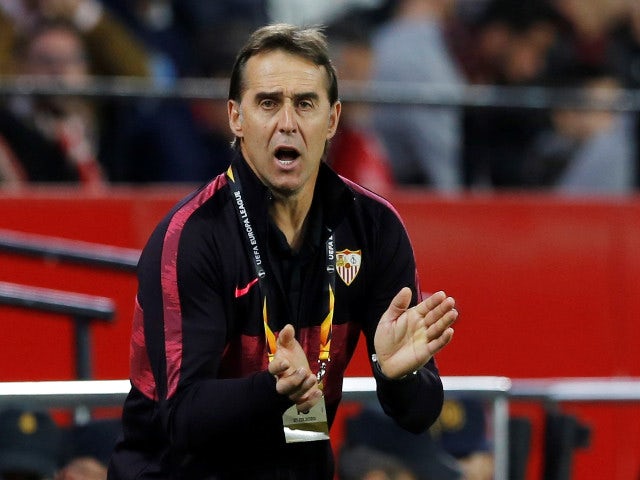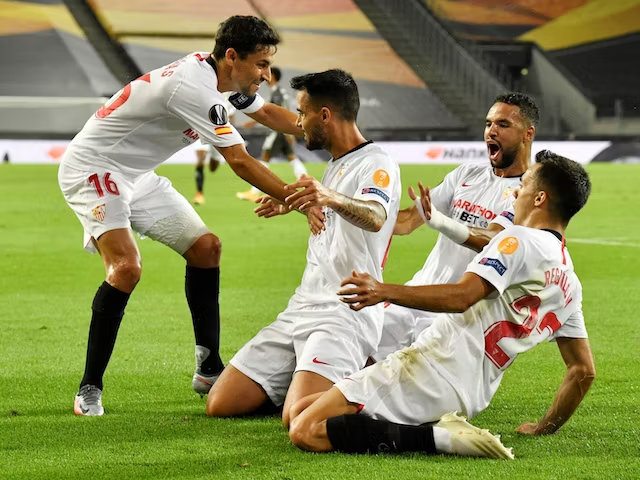After the appointment of Julen Lopetegui last summer, the general consensus was that Sevilla may go through a season of transition before benefitting from the guidance of the former Spain and Real Madrid boss.
However, as well as earning a spot in the top four of the La Liga table, Lopetegui has put Los Nervionenses in a position where they can claim their sixth Europa League crown in the space of 14 years.
While it can be argued that the Spanish side were provided with a relatively favourable draw during the group stages, the same cannot be said with regards to the latter part of their route through to the final.
Ahead of their showdown with Inter Milan on Friday night, Sports Mole takes a look at how Sevilla progressed through to the encounter in Koln.
Group stages
 © Reuters
© Reuters
Having been provided with opposition from Cyprus, Kazakhstan and Luxembourg, Lopetegui would have been delighted with what was perceived to be a routine passage through to the knockout rounds.
Qualification was effectively wrapped up in their opening three matches as victories over APOEL, Qarabag FK and F91 Dudelange were recorded without conceding a goal.
Top spot was secured in the fourth game as they ran out 5-2 winners at the home of the latter, who only got on the scoresheet once Sevilla had opened up a 5-0 advantage.
However, Sevilla missed out on advancing with a perfect record after succumbing 1-0 at APOEL, a result which saw their hosts claim the runners-up spot in the group.
Last 32: CFR Cluj (1-1 on aggregate, Sevilla progress on away goals)
Given the level of teams which were possible opponents in the last-32 draw, Sevilla and Lopetegui would have again been delighted with the outcome when CFR Cluj emerged as their next foes.
However, the Romanian outfit went ahead in the tie, leaving Sevilla to rely on a late Youssef En-Nesyri effort to give them an away goal heading into the reverse fixture in Spain.
Although Sevilla were made to sweat during a tense goalless draw at Estadio Ramon Sanchez Pizjuan, they were able to edge their way through to the next phase.
Last 16: Sevilla 2-0 Roma
While this tie was initially intended to be over two legs, the implications of the coronavirus pandemic meant that this was one of several contests to be reduced to a one-off encounter on neutral territory.
On paper, this was meant to be an evenly-matched clash between two of the tournament favourites, but Sevilla made relatively light work of the Serie A outfit in Duisburg.
First-half goals from Sergio Reguilon and En-Nesyri ensured that Lopetegui's side could ease their way through to a last-eight showdown with Wolverhampton Wanderers.
Quarter-finals: Sevilla 1-0 Wolverhampton Wanderers
 © Reuters
© Reuters
Despite the momentum generated by Wolves throughout the campaign, Sevilla ultimately prevailed by a late header from Lucas Ocampos.
However, it could have been a different story had Raul Jimenez not missed an early penalty for the English side, one which should have been retaken due to two infringements.
Nevertheless, after reducing their opponents to brief flurries during the closing hour of the match, Sevilla were fully deserving of their win.
Semi-finals: Sevilla 2-1 Manchester United
 © Reuters
© Reuters
Like in their success over Wolves, Sevilla conceded an early penalty, this time leading to Manchester United taking the lead in their semi-final showdown.
However, in an entertaining tussle, Lopetegui watched his side quickly equalise through Suso before Luuk De Jong netted the decisive goal 12 minutes from time.
While Sevilla heavily relied on the performance of goalkeeper Bono, this was evidence that they can beat the better sides without being at the top of their game.
No Data Analysis info










